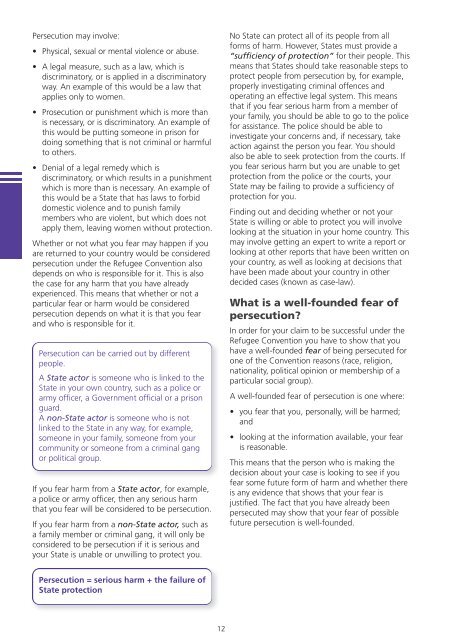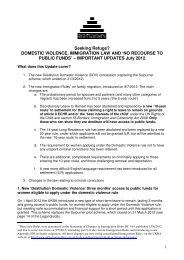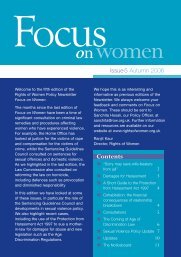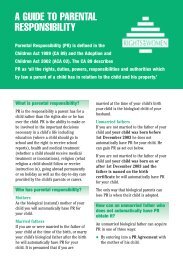Seeking Refuge? - Rights of Women
Seeking Refuge? - Rights of Women
Seeking Refuge? - Rights of Women
Create successful ePaper yourself
Turn your PDF publications into a flip-book with our unique Google optimized e-Paper software.
Persecution may involve:<br />
• Physical, sexual or mental violence or abuse.<br />
• A legal measure, such as a law, which is<br />
discriminatory, or is applied in a discriminatory<br />
way. An example <strong>of</strong> this would be a law that<br />
applies only to women.<br />
• Prosecution or punishment which is more than<br />
is necessary, or is discriminatory. An example <strong>of</strong><br />
this would be putting someone in prison for<br />
doing something that is not criminal or harmful<br />
to others.<br />
• Denial <strong>of</strong> a legal remedy which is<br />
discriminatory, or which results in a punishment<br />
which is more than is necessary. An example <strong>of</strong><br />
this would be a State that has laws to forbid<br />
domestic violence and to punish family<br />
members who are violent, but which does not<br />
apply them, leaving women without protection.<br />
Whether or not what you fear may happen if you<br />
are returned to your country would be considered<br />
persecution under the <strong>Refuge</strong>e Convention also<br />
depends on who is responsible for it. This is also<br />
the case for any harm that you have already<br />
experienced. This means that whether or not a<br />
particular fear or harm would be considered<br />
persecution depends on what it is that you fear<br />
and who is responsible for it.<br />
Persecution can be carried out by different<br />
people.<br />
A State actor is someone who is linked to the<br />
State in your own country, such as a police or<br />
army <strong>of</strong>ficer, a Government <strong>of</strong>ficial or a prison<br />
guard.<br />
A non-State actor is someone who is not<br />
linked to the State in any way, for example,<br />
someone in your family, someone from your<br />
community or someone from a criminal gang<br />
or political group.<br />
If you fear harm from a State actor, for example,<br />
a police or army <strong>of</strong>ficer, then any serious harm<br />
that you fear will be considered to be persecution.<br />
If you fear harm from a non-State actor, such as<br />
a family member or criminal gang, it will only be<br />
considered to be persecution if it is serious and<br />
your State is unable or unwilling to protect you.<br />
No State can protect all <strong>of</strong> its people from all<br />
forms <strong>of</strong> harm. However, States must provide a<br />
“sufficiency <strong>of</strong> protection” for their people. This<br />
means that States should take reasonable steps to<br />
protect people from persecution by, for example,<br />
properly investigating criminal <strong>of</strong>fences and<br />
operating an effective legal system. This means<br />
that if you fear serious harm from a member <strong>of</strong><br />
your family, you should be able to go to the police<br />
for assistance. The police should be able to<br />
investigate your concerns and, if necessary, take<br />
action against the person you fear. You should<br />
also be able to seek protection from the courts. If<br />
you fear serious harm but you are unable to get<br />
protection from the police or the courts, your<br />
State may be failing to provide a sufficiency <strong>of</strong><br />
protection for you.<br />
Finding out and deciding whether or not your<br />
State is willing or able to protect you will involve<br />
looking at the situation in your home country. This<br />
may involve getting an expert to write a report or<br />
looking at other reports that have been written on<br />
your country, as well as looking at decisions that<br />
have been made about your country in other<br />
decided cases (known as case-law).<br />
What is a well-founded fear <strong>of</strong><br />
persecution?<br />
In order for your claim to be successful under the<br />
<strong>Refuge</strong>e Convention you have to show that you<br />
have a well-founded fear <strong>of</strong> being persecuted for<br />
one <strong>of</strong> the Convention reasons (race, religion,<br />
nationality, political opinion or membership <strong>of</strong> a<br />
particular social group).<br />
A well-founded fear <strong>of</strong> persecution is one where:<br />
• you fear that you, personally, will be harmed;<br />
and<br />
• looking at the information available, your fear<br />
is reasonable.<br />
This means that the person who is making the<br />
decision about your case is looking to see if you<br />
fear some future form <strong>of</strong> harm and whether there<br />
is any evidence that shows that your fear is<br />
justified. The fact that you have already been<br />
persecuted may show that your fear <strong>of</strong> possible<br />
future persecution is well-founded.<br />
Persecution = serious harm + the failure <strong>of</strong><br />
State protection<br />
12
















